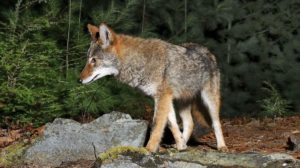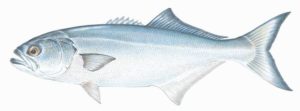Regulations to prohibit wanton waste and predator contests approved
By now you have probably heard or read that the Massachusetts Fisheries and Wildlife Board voted 6 to 1 to approve regulations prohibiting the waste of certain game animals, prohibiting hunting contests for certain predator and furbearing animals, and changing the harvest reporting requirements for fox and coyote. Board member Robert Durand was the sole negative vote. He then proposed two amendments to the regulations and they were both voted down 6 to 1.
So, here is a summary of regulation changes as established by the board. It cautions that the regulations are not yet in effect and are still subject to administrative processing prior to promulgation. MassWildlife anticipates that the regulations will go into effect well before the 2020 fall hunting season. A summary of the regulations is provided on its web page https://www.mass.gov/news/regulations.
Prohibition on Contests for the Capture, Take or Waste of Predator and Furbearer Animals
It shall be unlawful for any person to organize, sponsor, promote, conduct, or participate in a contest for the take of coyote, bobcat, red fox, gray fox, weasels, mink, skunk, river otter, muskrat, beaver, fisher, raccoon, and opossum. A predator or furbearer contest is where participants compete for prizes or other inducements in the capture or take of predatory or furbearing animals.
Prohibition on the Waste of Certain Game Animals
It shall be unlawful for any person while hunting or trapping to waste an animal. “Waste” means to intentionally or knowingly leave a wounded or dead animal in the field or the forest without making a reasonable effort to retrieve and use it. Each retrieved animal shall be retained or transferred to another until processed or used for food, the pelt, feathers, or taxidermy.
The waste regulation does not apply to:
Animals “unfit for consumption or use” – animals and their parts that are damaged, destroyed, decayed, rotting, diseased, or infected.
Defense of people or property.
Problem wildlife, such as Beaver Emergency Permitting and Problem Animal Control.
Certain animals such as English sparrow, starling, crow, chipmunk, flying squirrel, red squirrel, porcupine, skunk, weasel, or woodchuck.
Wounded or dead animals that cannot be retrieved after a reasonable effort has been made.
Change harvest reporting requirements of Hunting of Bobcat, Fox and Coyote and the Hunting and Trapping of Certain Game Mammals
Fox and coyote shall be checked within 48 hours of harvest, consistent with deer, bear, and turkey requirements. Fox and coyote may be checked online or in person.
To the livestock farmers who perhaps will be more affected by the wanton waste regulation than anyone else, MassWildlife included the following comments:
The regulations are specifically designed to preserve all options currently available to the public and to farmers experiencing livestock depredation by coyotes, and do not, in any way, reduce the opportunity for coyote hunting. The following options currently available to livestock farmers and other property owners will all remain available and unchanged under the new regulations:
• Whenever lethal removal of an animal causing conflict is warranted, MassWildlife recommends that a farmer or landowner invite hunters onto the property during the regulated season in order to promote the utilization of the resource and ensure that the animal is not wasted.
• MassWildlife assures property owners, their families, and employees will still be able to protect their property year–round by killing an animal that is in the act of causing damage (including depredation) and this is exempt from the wanton waste regulation. Also, property owners can hire a licensed Problem Animal Control Agent to trap or shoot the offending animal, an activity that is also exempt from the wanton waste regulation.
• MassWildlife can also issue a special permit to farmers experiencing livestock depredation from coyotes. This option allows the farmer to invite licensed hunters onto their property, both during and outside of the regulated seasons, to take coyotes in order to mitigate the issue and the wanton waste rule would not apply.
• MassWildlife asserts that while the regulations do not decrease options available to landowners and farmers experiencing property damage or reduce the opportunity to hunt coyotes or other furbearers, it is important to note that coyote hunting in Massachusetts cannot control the coyote population and has not and cannot prevent livestock depredation or other types of human-coyote conflict. This is due to the inherent biology and population structure of coyotes.
• MassWildlife believes hunting can randomly remove animals that are depredating on livestock or causing other conflict, but it may also remove animals that are not. Because hunting cannot control the population, there will always be coyotes around farms and some livestock depredation is unfortunately inevitable. MassWildlife has always been and will continue to be committed to working with farmers and livestock producers to minimize and mitigate conflict when it occurs.
So there you have it folks; like it or not, it will shortly become the law and we must comply. Let’s hope that it isn’t the gateway for implementing more hunting restrictions in the future.
Big Cut in Bluefish Bag Limit
If you enjoy going down to the Cape or Rhode Island fishing for blues, this will be of interest to you. Earlier this month, fishery managers approved new regulations for the 2020 recreational bluefish fishery. These measures, which include a 3-fish bag limit for private anglers and a 5-fish bag limit for for-hire fishermen, represent a substantial reduction compared to the federal 15-fish bag limit that has been in place since 2000.
The most recent assessment of the Atlantic bluefish stock concluded that the stock is overfished. In October, managers called for an 18% decrease compared to 2019 and considered several combinations of bag limits and minimum size limits. Although the Bluefish Monitoring Committee recommended a coastwide 3-fish bag limit, the majority of comments from the public and Bluefish Advisory Panel (AP) members expressed opposition to this option, noting that it would have severe economic consequences for the for-hire sector, which was only responsible for 3.6% of coastwide landings from 2016 to 2018. Additionally, AP members and the public emphasized that these proposed reductions come at a challenging time for for-hire stakeholders as they are also facing new restrictions on striped bass, black sea bass, summer flounder, and scup.
After an extensive discussion and thorough consideration of public comments, the Council recommended and Commission approved a 3-fish bag limit for private and shore modes and a 5-fish bag limit for the for-hire mode. No restrictions were made to minimum fish size or seasons.
“For many years, bluefish has been one of our most abundant recreational fisheries,” said Council Chairman and ASMFC Board member Mike Luisi. “The Council and Commission are fully committed to the effective conservation and management of this stock, but we also recognize that a sudden change in regulations could have severe socioeconomic consequences for some stakeholders. After evaluating a wide range of options and considering numerous comments from the public, we feel that this approach is the most fair and effective way to achieve the necessary reduction in harvest next year.”
Ladies LTC Classes
The Lenox Sportsmen’s Club will be holding its first Ladies Only License-to-Carry and Utah firearms course on January 5, 2020. The course, which is Mass State Police Compliant will run from 10:00 am to 2:00 pm. The stand-alone prices for the various states are: $70.00 MA, $125.00 UT, $125.00 AZ, $125.00 CT and $125.00 FL. Combine any two for $150.00, any additional state above two is $50.
Pre-registration required. Contact Tom Nadolny at 413-822-6451 or tnadolny1@gmail.com
Last of the deer hunting seasons end this Tuesday
After December 31, the only hunting seasons open will be crow, cottontail rabbit, snowshoe hare, bobcat, coyote, fox, opossum and racoon. These seasons end at different dates so be sure to check the hunting laws.
Happy new year!
